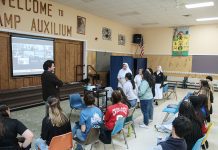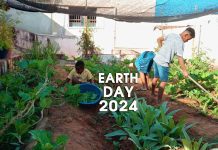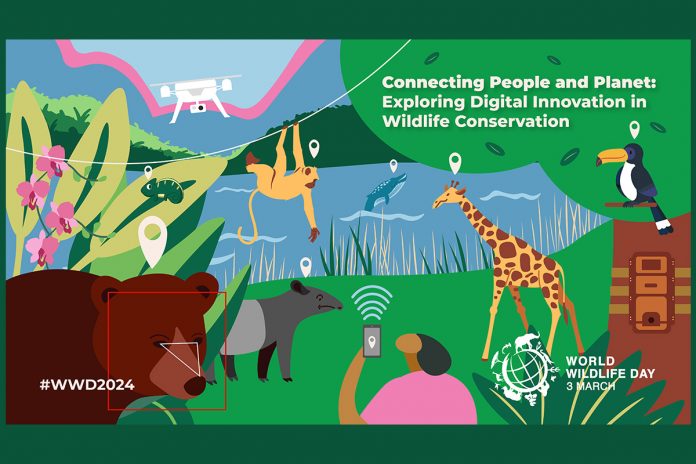Rome (Italy). World Wildlife Day is celebrated on 3 March 2024, established in 2013 by the United Nations General Assembly “to raise public awareness about the protection of the world’s wild fauna and flora.” This date was chosen because the Convention on International Trade in Endangered Species of Wild Fauna and Flora was signed on 3 March 1973.
With the 2024 theme – Connecting people and planet: exploring digital innovation in wildlife conservation – it aims to take digital innovation into consideration to highlight how digital conservation technologies and services can support wildlife conservation, sustainable and legal trade in wild animals, and coexistence between humans and wildlife. This is both in the present and for future generations, in an increasingly connected world.
Technological innovation has made research, communication, and many other aspects of wildlife conservation simpler, more efficient and accurate. However, unequal access to these new tools, environmental pollution, and unsustainable applications of some technologies remain crucial issues for achieving universal digital inclusion.
World Wild Day constitutes an opportunity for intergenerational exchange, promoting awareness among young people through knowledge of the state of the art and future opportunities for a shared sustainable future, in relation to the digital conservation of wildlife:
“Every year thousands of plant and animal species disappear that we will no longer be able to know, that our children will not be able to see, lost forever. The vast majority become extinct for reasons having to do with some human activity. Because of us, thousands of species will not give glory to God with their existence nor will they be able to communicate their message to us. We don’t have the right,” says Pope Francis (Laudato Si’ 33).
WWD2024 therefore offers a starting point to explore the digital innovations available today, the challenges we are facing, and how we want digital connectivity to evolve for all people and for the planet. From this perspective, the Pope in the Message for the World Day of Peace 2024 urges formation in responsibility:
“The immense expansion of technology must therefore be accompanied by adequate formation in responsibility for its development. Freedom and peaceful coexistence are threatened when human beings give in to the temptation of selfishness, self-interest, the desire for profit, and the thirst for power. We therefore have the duty to broaden our gaze and direct technical-scientific research towards the pursuit of peace and the common good, at the service of the integral development of humanity and the community.”
Wildlife Day is also an opportunity to remember how people around the world rely on wildlife and biodiversity-based resources to meet their needs: from food, to fuel, to medicine, to shelter and clothing. Nature remains the basic source of sustenance from a nutritional, economic, and health, including mental, point of view.
The populations of all nations rely on the vital contribution of nature for survival and well-being: “The loss of forests and woodlands implies at the same time the loss of species that could constitute extremely important resources in the future, not only for food, but also for the treatment of diseases and for multiple services. The different species contain genes that may be key resources for responding to some human needs or solving some environmental problems in the future. (LS 32)
Last but not least, this Day recalls the increasingly urgent need to intensify the fight against crimes perpetrated against wildlife and the numerous animal species threatened by human actions.
Integral ecology in the perspective of the Preventive System, indicated in the Priority Choices of the XXIV General Chapter of the Institute of the Daughters of Mary Help of Christians – Allowing oneself to be challenged by the cry of the young, the poor, and the earth, towards a conversion to integral ecology and the assumption in the network of the seven objectives of Laudato Si’, in the spirit of the Preventive System – becomes a call to continue to form young people, together with the Educating Communities of all the world’s realities, on the importance of formation on integral ecology, planning and proposing , as Pope Francis teaches in Laudato Si’, journeys that recover “the different levels of ecological balance: the internal one with oneself, the one in solidarity with others, the natural one with all living beings, the spiritual one with God.
Environmental education should prepare us to take that leap towards the Mystery, from which an ecological ethic draws its deepest meaning. On the other hand, there are educators capable of resetting the pedagogical itineraries of an ecological ethic, so that they actually help to grow in solidarity, responsibility and care based on compassion” (LS 210).





















Gracias por recordarnos, en la media q nos dejemos educar por El medio ambiente de la naturalezza creceremos en compacion…buen Domingo. Sor Aida